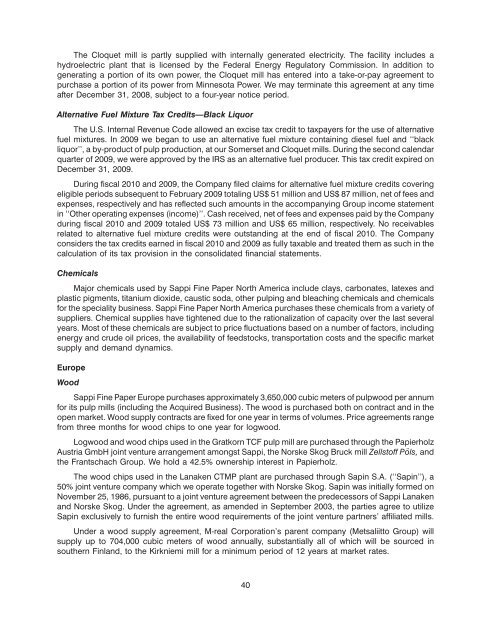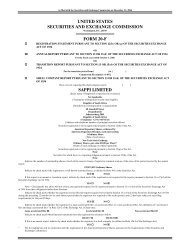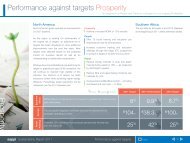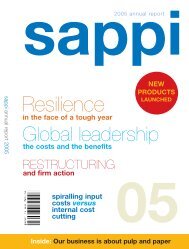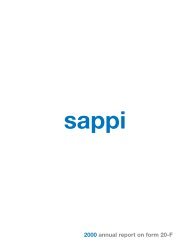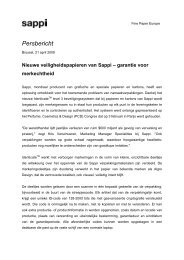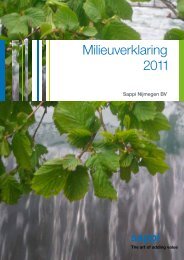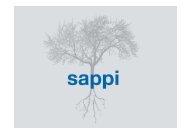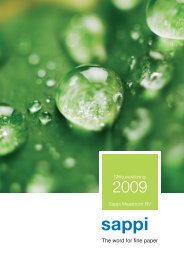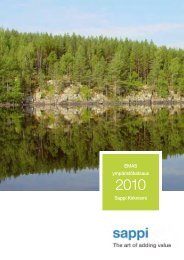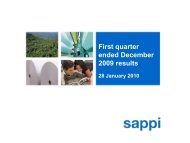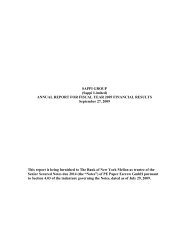You also want an ePaper? Increase the reach of your titles
YUMPU automatically turns print PDFs into web optimized ePapers that Google loves.
The Cloquet mill is partly supplied with internally generated electricity. The facility includes a<br />
hydroelectric plant that is licensed by the Federal Energy Regulatory Commission. In addition to<br />
generating a portion of its own power, the Cloquet mill has entered into a take-or-pay agreement to<br />
purchase a portion of its power from Minnesota Power. We may terminate this agreement at any time<br />
after December 31, 2008, subject to a four-year notice period.<br />
Alternative Fuel Mixture Tax Credits—Black Liquor<br />
The U.S. Internal Revenue Code allowed an excise tax credit to taxpayers for the use of alternative<br />
fuel mixtures. In 2009 we began to use an alternative fuel mixture containing diesel fuel and ‘‘black<br />
liquor’’, a by-product of pulp production, at our Somerset and Cloquet mills. During the second calendar<br />
quarter of 2009, we were approved by the IRS as an alternative fuel producer. This tax credit expired on<br />
December 31, 2009.<br />
During fiscal 2010 and 2009, the Company filed claims for alternative fuel mixture credits covering<br />
eligible periods subsequent to February 2009 totaling US$ 51 million and US$ 87 million, net of fees and<br />
expenses, respectively and has reflected such amounts in the accompanying Group income statement<br />
in ‘‘Other operating expenses (income)’’. Cash received, net of fees and expenses paid by the Company<br />
during fiscal 2010 and 2009 totaled US$ 73 million and US$ 65 million, respectively. No receivables<br />
related to alternative fuel mixture credits were outstanding at the end of fiscal 2010. The Company<br />
considers the tax credits earned in fiscal 2010 and 2009 as fully taxable and treated them as such in the<br />
calculation of its tax provision in the consolidated financial statements.<br />
Chemicals<br />
Major chemicals used by Sappi Fine Paper North America include clays, carbonates, latexes and<br />
plastic pigments, titanium dioxide, caustic soda, other pulping and bleaching chemicals and chemicals<br />
for the speciality business. Sappi Fine Paper North America purchases these chemicals from a variety of<br />
suppliers. Chemical supplies have tightened due to the rationalization of capacity over the last several<br />
years. Most of these chemicals are subject to price fluctuations based on a number of factors, including<br />
energy and crude oil prices, the availability of feedstocks, transportation costs and the specific market<br />
supply and demand dynamics.<br />
Europe<br />
Wood<br />
Sappi Fine Paper Europe purchases approximately 3,650,000 cubic meters of pulpwood per annum<br />
for its pulp mills (including the Acquired Business). The wood is purchased both on contract and in the<br />
open market. Wood supply contracts are fixed for one year in terms of volumes. Price agreements range<br />
from three months for wood chips to one year for logwood.<br />
Logwood and wood chips used in the Gratkorn TCF pulp mill are purchased through the Papierholz<br />
Austria GmbH joint venture arrangement amongst Sappi, the Norske Skog Bruck mill Zellstoff Pöls, and<br />
the Frantschach Group. We hold a 42.5% ownership interest in Papierholz.<br />
The wood chips used in the Lanaken CTMP plant are purchased through Sapin S.A. (‘‘Sapin’’), a<br />
50% joint venture company which we operate together with Norske Skog. Sapin was initially formed on<br />
November 25, 1986, pursuant to a joint venture agreement between the predecessors of Sappi Lanaken<br />
and Norske Skog. Under the agreement, as amended in September 2003, the parties agree to utilize<br />
Sapin exclusively to furnish the entire wood requirements of the joint venture partners’ affiliated mills.<br />
Under a wood supply agreement, M-real Corporation’s parent company (Metsaliitto Group) will<br />
supply up to 704,000 cubic meters of wood annually, substantially all of which will be sourced in<br />
southern Finland, to the Kirkniemi mill for a minimum period of 12 years at market rates.<br />
40


